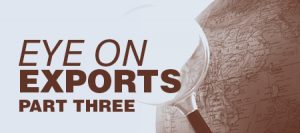
With the U.S. e-scrap industry continuing to rely on the export market, companies are not only contending with domestic laws and certification requirements – they’re navigating a wide range of complex and unique international laws as well.
According to the Institute of Scrap Recycling Industries (ISRI), the U.S. e-scrap industry exports $1.45 billion worth of material annually. Up from less than $1 billion in 2002, exports have become essential to many bottom lines due to a variety of factors, including skyrocketing overseas demand for refurbished devices and an appetite for scrap material otherwise destined for landfill in the U.S.
But exports have in recent years also attracted increased scrutiny. The Basel Action Network (BAN), perhaps the most notable critic of the industry’s reliance on exports, argues that much of the current trade is not only ethically questionable, but it routinely breaks international law.
BAN’s ongoing e-Trash Transparency Project has tracked several dozen shipments overseas, exports that the group says are “likely illegal” under international law. What’s more, BAN this week released details on trackers it placed inside scrap electronics in Europe. The devices were eventually sent to crude recycling facilities in Thailand.
BAN continues to call for an outright ban on hazardous waste trade between developed and developing countries through an amendment to the Basel Convention, the seminal treaty that went into effect in 1992 to limit hazardous waste trade.
Jim Puckett, BAN’s executive director, told E-Scrap News proponents of the amendment, which is known as the Basel Ban Amendment, are “really, really close” to gaining enough support to incorporate the outright ban. “That method is just the strongest of all,” Puckett said.
But what does the Basel Convention currently have to say about exports of e-scrap and how are individual nations going about regulating the flow of used devices and scrap materials across their borders?
As the third and final installment of our Eye on Exports series, E-Scrap News reached out to experts on both sides of the debate to get a better grasp of the legal considerations in play and how companies are navigating them. Part One of the series covered exports under U.S. law, and Part Two explored how certification standards affect international trade.
The role of the Basel Convention
When considering international law and e-scrap exports, the Basel Convention is the place to begin.
The convention went into effect in May 1992 with the central goal of limiting the global trade of hazardous waste, especially between developed and developing countries. At present, the treaty counts a total of 186 parties, all of whom are expected to align their national policies and laws with those of the treaty and enforce them.
“Each Party shall take appropriate legal, administrative and other measures to implement and enforce the provisions of this Convention, including measures to prevent and punish conduct in contravention of the Convention,” the convention reads.
While establishing a number of important international trade protocols and practices, the treaty does not ban the trade of hazardous waste altogether. Parties are, in fact, allowed to trade hazardous wastes, including non-functional devices and scrap materials, as long as they have received prior consent from countries of export, transit and import to do so and have ensured that the shipment will be “managed in an environmentally sound manner,” the convention states.
Billy Johnson, ISRI’s director of political and public affairs, noted gaining consent for such shipments overseas can be a challenge.
“You need to have the permission of the importing country to take the material – that’s probably the biggest law that you have to jump through,” Johnson said.
Importantly, the convention does not regard all e-scrap as hazardous waste, however. It clearly states that e-scrap can be be treated as a non-hazardous waste – and therefore not subject to the export controls of the treaty – as long as it does not exhibit what the treaty refers to as “hazardous characteristics,” such as flammability and toxicity.
In addition, the consent and management requirements of the treaty may not come into play when dealing with used devices bound for repair and reuse. In that case, individual parties to the convention make the determination whether the devices constitute a waste – and a potentially hazardous one – or whether they are non-wastes and free of export controls.
“If something is not a waste, then Basel never applies,” Puckett pointed out.
A technical guidance document has been crafted to help countries make this distinction and argues that a device is a waste if, for instance, “essential parts are missing and the equipment cannot perform its essential key functions” or “it shows a defect that materially affects its functionality and fails relevant functionality tests.”
The treaty also allows for parties to “impos[e] additional requirements that are consistent with the provisions of this Convention, and are in accordance with the rules of international law, in order better to protect human health and the environment.”
Where the U.S. fits in
While the U.S. signed the treaty in 1990, legislation has not been introduced to allow its ratification. Perhaps the most significant consequence of this is that the U.S. government is not bound to the enforcement requirements of the treaty, which holds parties responsible for prosecuting illegal hazardous waste trafficking as a crime.
BAN’s Puckett said this leaves U.S. companies safe from legal peril, regardless of their actions.
“They know they’ll never be prosecuted. Only the importers will be prosecuted,” he said.
That said, U.S. companies are still required to follow the laws of both developed and developing countries, many of which have not only ratified and installed the Basel Convention into law but have added additional requirements.
China, for instance, recently announced it will be inspecting every imported load of e-scrap for possible contamination or hazardous materials. Hong Kong has also been cracking down on imports, while India has ramped up its efforts to accept more devices bound for reuse.
What’s more, current parties to the treaty are not permitted to accept hazardous waste from non-parties, such as the U.S., unless an explicit agreement is in place that does not “derogate from the environmentally sound management of hazardous wastes and other wastes as required by this Convention,” the treaty states.
The U.S. EPA website notes there are five such agreements with Basel Convention parties in place at present. Canada and Mexico have agreements in place with the U.S. to import and export hazardous waste. In addition, the U.S. is permitted only to receive hazardous waste from Costa Rica, Malaysia and the Philippines.
Navigating overseas shipments
Most observers note that the key for U.S. companies sending loads overseas to Basel Convention parties is to determine whether the material in question is a waste and, if so, whether it’s hazardous.
“The laws and regulations are written to regulate international shipments of hazardous waste,” said Corey Dehmey, director of the R2 standard at Sustainable Electronics Recycling International (SERI). “In order to be a hazardous waste, it must first be established that it is a waste. It is not always clear with electronics.”
According to Dehmey, “determining what is and what is not a waste in used electronics according to these various laws and regulations is the first complexity to determining the legality of a U.S. shipment overseas.” SERI recently issued guidelines to help companies understand what is and isn’t legal to ship to Hong Kong, for example.
Jeff Gloyd, vice president of sales and marketing at e-scrap processor URT, said there are “two issues of concern” when attempting to ship material abroad.
“First is the designation of the material. Most countries restrict the import of ‘waste.’ Gaining approval or processing material to a point where it becomes an industrial product for use is key,” Gloyd noted. “Second is the level of contamination. … It is difficult at times to develop a clean product that will meet standards. This is primarily due to the consumer grade material that our industry processes.”
To help navigate these obstacles, Gloyd said URT “works closely with downstream staff and partner consultants to ensure our material is ready for export and will be accepted and processed at the receiving port.”
Robin Ingenthron, owner of Good Point Recycling and an advocate of exports, noted his company aims to know the laws inside and out. He is also the founder of WR3A.org, a business consortium that goes by the name Fair Trade Recycling.
“Our approach is to know more about the international law than anyone likely to accuse us of violating it,” Ingenthron said. “And in the meantime, make sure all the trade is ethical and good for the environment, legal or not.”
Ingenthron and Puckett have recently engaged in a debate over a recent report from the United Nations University on Nigerian imports of e-scrap. Their debate comes down to different interpretations of how e-scrap is viewed under the Basel Convention.
The dispute helps illustrate why getting a grasp of international law isn’t always simple. Kelley Keogh, managing director of auditing firm Greeneye Partners, said easily overlooked challenges can be especially tricky to navigate. Linguistic barriers pop up frequently when examining translated legal documents, for instance.
“Sometimes when I’m looking at them … I’m not sure of what they’re saying, because I don’t always know who translated it and how they translated – and, of course, it’s subtle,” Keogh said. “That part is really challenging. … I might have three different people translate a permit and I might get three different versions of it. Without really clear language, no one can be sure if it’s okay to send them material.”
Laws getting in the way or aiding industry?
As is common in the e-scrap industry, there’s no universal takeaway from the export landscape.
URT’s Gloyd said the impact of international law is a mixed bag.
“Weeding out questionable practices can be helpful for our industry. A level playing field is important to encourage competition and innovation,” Gloyd said. “That said, making decisions that can restrict flow of material from recyclers and to re-possessors can negatively impact the entire supply chain. This can be particularly disruptive to supply and pricing if the decisions are made without proper input from all stakeholders.”
Good Point’s Ingenthron, meanwhile, believes the attempt to root out bad actors has unfairly dissuaded good actors from shipping material abroad. “[It] probably does more harm than good,” he noted. “The effect has been like a ‘war on drugs’ – good people are dissuaded from exporting legitimate product, and the price goes up and quality goes down.”
At the same time, BAN has continued to push for making international law even more stringent with the inclusion of the Basel Ban Amendment.
Originally adopted in 1995, the amendment takes export controls a step further by prohibiting all hazardous waste trade between developed and developing parties. It has since been put into law by the European Union and has been ratified by 65 of the 90 parties that were present at the time of its original adoption more than 20 years ago.
That said, it still lacks the necessary support to come into force. According to Puckett, it needs three more countries to join before the amendment is incorporated into the Basel Convention itself.
“There’s been perpetual fighting over it, but it’s going to come into force really, really soon,” Puckett said. “It could happen within the next year or two.”
Puckett is less optimistic, however, about the prospect of the U.S. ratifying the Basel Convention.
“The way Congress is, I don’t see anything getting done,” Puckett said. “I just don’t see it happening.”
More stories about exports
- Wisconsin E-Cycle report reflects increasing access
- Policy round-up: Solar stewardship, state changes
- Right to repair in WA and battery EPR in Nebraska



